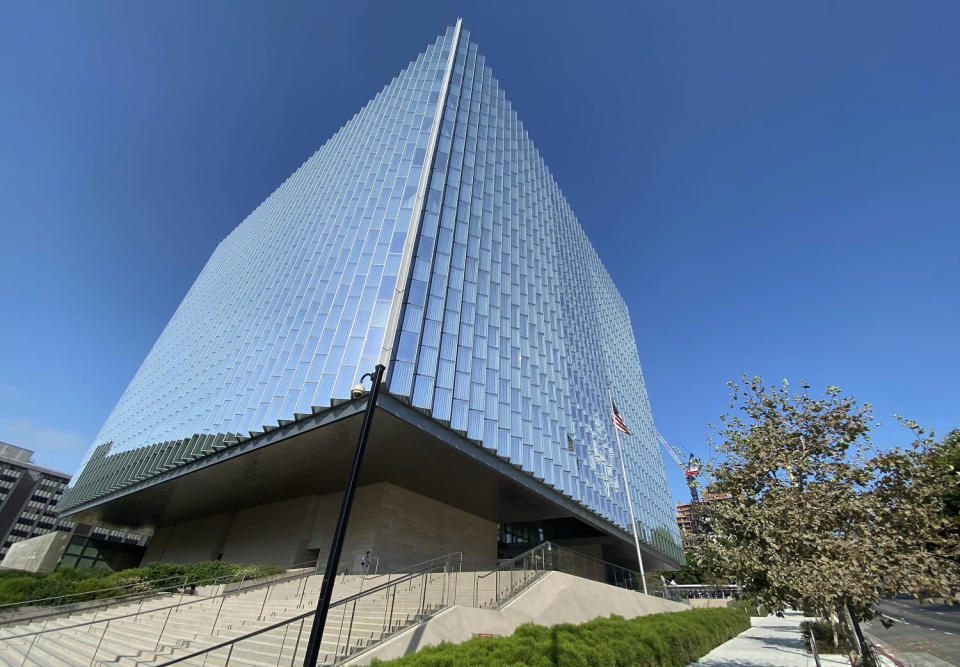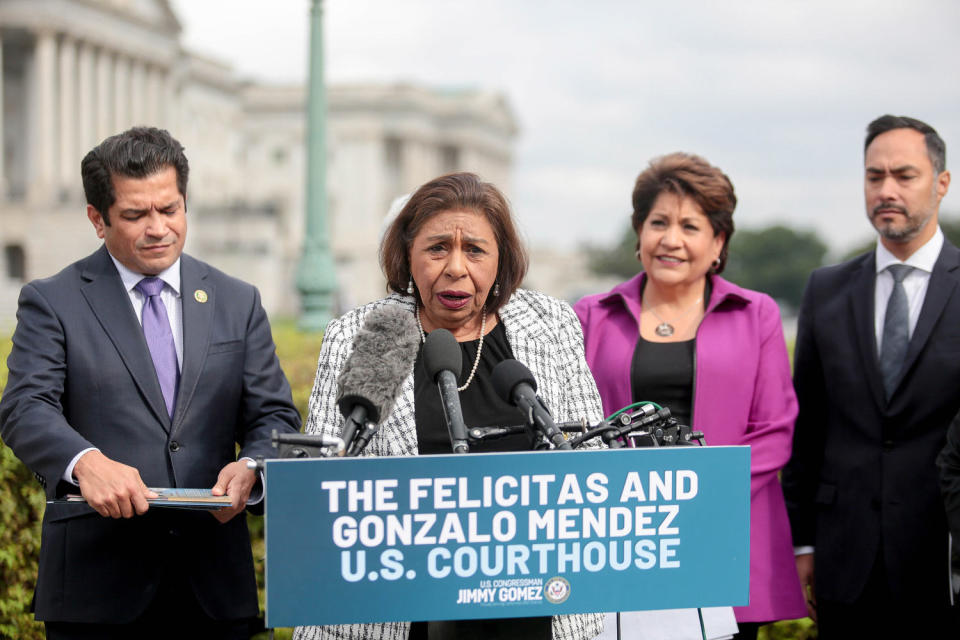Bill seeks to rename L.A. courthouse after Latino family's desegregation legacy
- Oops!Something went wrong.Please try again later.
- Oops!Something went wrong.Please try again later.
Rep. Jimmy Gomez, D-Calif., introduced legislation Wednesday to rename the Los Angeles U.S. Courthouse in honor of a Latino family who paved the way for school desegregation.
Almost eight decades ago, in the area where the courthouse stands, Felicitas and Gonzalo Mendez brought a lawsuit that ended school segregation in California in 1947 and was later used as a blueprint for the 1954 Brown v. Board of Education landmark ruling, that found segregation in public schools unconstitutional. Felicitas was Puerto Rican and her husband Gonzalo was Mexican American.
"When Felicitas and Gonzalo Mendez and four other courageous families challenged segregation in California schools 77 years ago, they not only stood up for their own children — they took a stand for the civil rights of students of color everywhere and left a legacy," Gomez told NBC News on Tuesday.
Renaming his district’s courthouse as the Felicitas and Gonzalo Mendez U.S. Courthouse would also be the first time a federal courthouse is named after a Latina, he said.

At a press conference on Wednesday in Washington, D.C., Gomez was joined by several Latino leaders including Sylvia Mendez, Felicitas' and Gonzalo's daughter.
Mendez remembers being at the center of the legal fight in the Mendez v. Westminster School District of Orange County case after being denied enrollment at her neighborhood school in Westminster.
As a 9-year-old third grader in 1945, all she wanted was to attend the “beautiful school” with the “nice playground,” not knowing it was reserved for white children only.
Instead, every day she trudged over to the “Mexican school,” a rundown building next to a cow pasture. The conditions there were terrible, she recalled in an interview with NBC News in 2021.
That's when her parents and four other families sued the school district, challenging its segregation practices.
The Mendez family won in federal court in 1946, with Judge Paul J. McCormick writing, “A paramount requisite in the American system of public education is social equality. It must be open to all children by unified school association regardless of lineage.”
The family won again in 1947, after the school district appealed the decision.
Two months after the appeal, then-California Gov. Earl Warren signed legislation to officially end desegregation in public schools.
Attorney Thurgood Marshall, who had filed a brief on behalf of the NAACP in support of the Mexican families, later used the legal framework of the Mendez case as a road map to argue Brown v. Board of Education at the Supreme Court.
“My parents and the four other families in this case refused to give up on their vision for a more equal society for their children, where the color of someone’s skin doesn’t determine their access to education,” Sylvia Mendez said at the press conference. “I am eager to see Rep. Gomez’s bill move forward to preserve this important piece of Hispanic history.”

The Mendez family’s fight should be recognized as “a powerful symbol of the enduring Latino American legacy and our nation’s broader struggle for equality,” Gomez said.
“The story of Felicitas and Gonzalo Mendez is the story of two parents who fought for their children — and in doing so, changed the world,” Rep. Joaquin Castro, D-Texas, said at the press conference.
Rep. Nanette Barragán, D- Calif. and chair of the Congressional Hispanic Caucus, said that “Felicitas and Gonzalo Mendez, along with four other heroic families, are Latino heroes."
The legislation is supported by members of the Congressional Hispanic Caucus, as well as by national Latino organizations and top Latino civil rights leaders, such as UnidosUS President Janet Murguía and Thomas Saenz, president and general counsel at the Mexican American Legal Defense and Educational Fund, or MALDEF.
“This Hispanic Heritage Month, I am making sure Latino stories are enshrined in American civil rights history," Gomez said.
Hispanic Heritage Month kicked off Sept. 15 and ends Oct. 15.
This article was originally published on NBCNews.com
